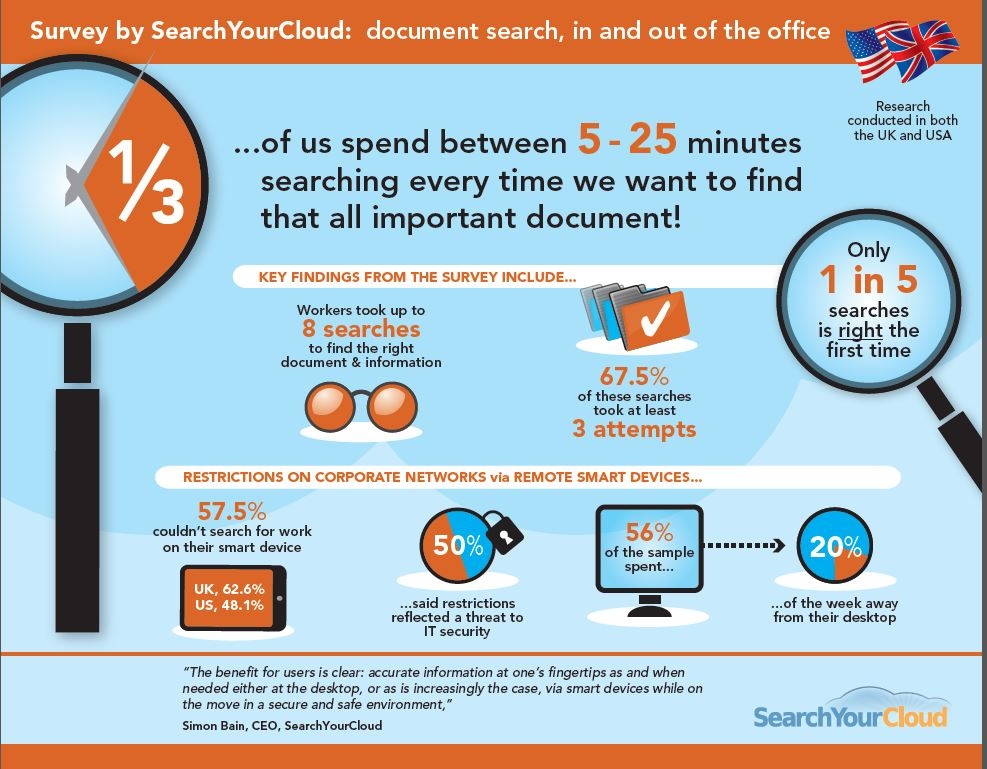We all are aware of the saying, “Time is Money!” Time spent wisely is about making money and time spent unproductively is, in a word, “wasteful.” And, while this axiom has always been true, in the Internet era has even more relevance. It is in fact why so much effort is concentrated on automating as much as possible to free us up to do “more productive” things.
In the electronic workplace a great deal of time is spent, arguably wasted, in such tasks as deleting hundreds of useless emails a day, playing telephone tag and in searching for things we know we need and being unable to put our fingers or mouse on them quickly. Unified Communications (UC) solutions, presence and a host of other capabilities are designed to make us more efficient and effect in real-time, but solutions to that last item on finding things has stubbornly been elusive.
To get a handle on how much time and effort is spent on unproductive search, particularly now that this is not just about our hard drives on our PCs and personal devices but also on corporate servers and in the cloud, search optimization specialists SearchYourCloud recently surveyed over 300 enterprise knowledge workers in the UK and the US. The survey showed that a third of respondents spend between five and twenty-five minutes searching every time they want to find a document, while only one in five searches is correct the first time.
The survey concluded what we all suspect, i.e., that the search for corporate information is eating into workplace productivity. Plus, as the authors of the findings note, “Despite the mobile revolution and access to content via multiple devices, search remains a complex and time consuming exercise which wastes valuable time.”
The infographic below illustrates the problem.

Source: SearchYourCloud
The research found that on average, workers in both the U.K. and U.S. spent up to 25 minutes looking for a single document in over a third of searches conducted. The exception was that there were some disparities between the two countries based on differing attitudes on BYOD and mobile security.
Most troubling in the findings was that in 80 percent of cases it took up to eight attempts to find the right information. Only 20 percent of respondents reported first time successful searches.
For those accustomed to text rather than infographics the key findings from the survey were as follows:
- It takes workers up to eight searches to find the right document and information, according to 80 percent of respondents.
- 67.52 percent of searches take at least three attempts.
- Just over 30 percent of searches take up to 25 minutes per document.
- 58 percent of the entire sample responded that they could not search for work related information on their smart device. As noted, because of different attitudes on the respective sides of the Atlantic, that number rises to 63 percent in the UK because of stricter rules and falls to 48 percent in the US.
- When asked if this inability reflected a threat to IT security, just over 50 percent said that it did.
- Despite restrictions on remote smart device access to the corporate network, 56 percent of the entire sample spent up to 20 percent of the work week away from their desktop.
- Of those working remotely, 46 percent needed access to the corporate network almost continually throughout the day.
In commenting on the survey results, Simon Bain, SearchYourCloud CEO, stated, "I'm sure we've all been there. You search the desktop, then open up a word processor app still not finding a document. You then search for the template to use or the file open button. All second nature, but what happens when we can't find the document? It is the same human emotion as if we had lost set of keys. But there is a difference - search apps on the desktop or mobile device do not remember where you last had that file and this is adding to lost productivity within the workplace.
This survey shows that what is needed is a transformative secure search application that not only speeds up the search process itself, but one that dramatically improves accuracy. The benefit for users is clear: accurate information at one's fingertips as and when needed either at the desktop, or as is increasingly the case, via smart devices while on the move in a secure and safe environment.”
As someone whose profession and productivity is directly linked to my ability to find what I need as quickly as possible, I could not agree with Bain’s observation more. The frustration of not being able to find an important file when on deadline is a great way to raise one’s blood pressure in a hurry. In this regard, you may wish to visit the SearchYourCloud website for a better understanding of why relief from frustration appears to be at hand. Time is after all a finite resource that we cannot create more of, but can only use better. Not having to spend time searching as hard as we do is one of those areas where exponential improvements can translate directly to the bottom line.